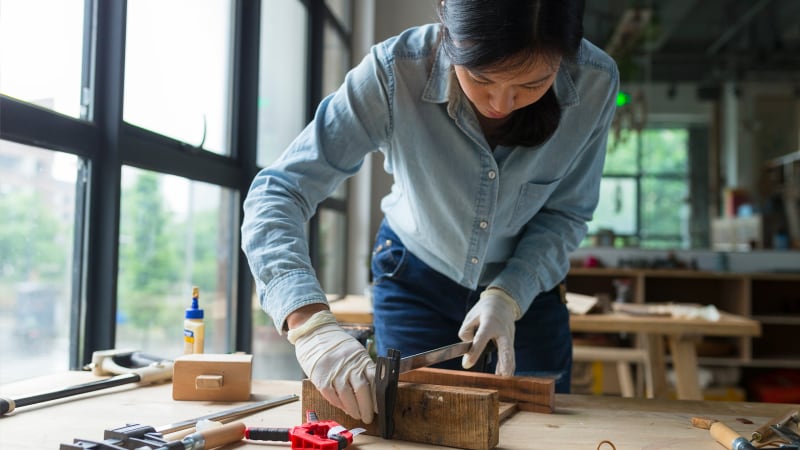How to increase your home's value

If you're like most people, your home is your biggest financial asset. As your home increases in value, so does your equity. Equity is the difference between how much you owe on your home and what it's worth. That difference can become profit when you sell your home.
Understanding how to determine the value can help you maximize the value of your own home. You'll also want to know what buyers are looking for so you can make your home stand out.
How is the value of your home determined?
There are many factors that go into determining the value of a home, including:
- Your neighborhood. If your home is in a desirable neighborhood with good schools, access to local shops and close to major employers, it's likely going to have a higher value.
- Your home's size. The bigger the home, the more it's likely going to be worth. But it's more than just square footage—useable, livable space and room types matter.
- Your home's age. As time goes on, your house may begin to show its age. Older homes may have issues with things like the foundation, gutters and windows which can negatively impact your home's value.
- Your home's condition. Things like the condition of the roof, siding and landscaping can impact its value. Staying on top of things and keeping good records of maintenance work can help maintain your home's value.
- Your home's appearance. Homes that are well kept and have up-to-date features will likely be more appealing to buyers. Outdated kitchens and bathrooms may have a negative impact on your home's value.
- The local market. If the local housing market is slow or flooded with homes, you may not get as much for your home. Sometimes waiting for the market to turn around can help.
The value of your home will fluctuate over time, going up and down as these factors change, which can make it tough to predict when your home is going to be at peak value. However, you can keep an eye on the market and see what houses like yours are selling for. You can also take steps to increase your home's value in other ways.
How do you find out how much your home is worth?
If you're curious about the value of your home, there are a few ways you can get a good estimate.
- Start with online valuation tools. These allow you to enter information about your home and its location, which they use to provide you with an estimated value. These online calculators can give you a starting point to estimate how much equity you might have in your home.
- Check out the sales information for homes in your area on real estate websites. Look for homes similar to yours in size and condition and see what they sold for. That will give you an idea about how the market is performing and what you might be able to get for your home if you chose to sell it.
- If you want the most accurate valuation possible, though, pay a professional appraiser to determine it's worth. This will give you the most accurate estimate of its value, but it's no guarantee of what you'll get on the market.
When is the best time to increase the value of your home?
Most people will think about their home's value the most when they are considering selling it, but really, you should be thinking about your home's value from the time you purchase it.
Increasing its value is something best done over time, as that will help you spread out the cost of home improvement projects. It will also give you an opportunity to enjoy the improvements before you move. But remember, not all home improvement projects will increase your home's value.
What to consider before you start a value-boosting project
- The cost of the project. There are a lot of home improvement projects that can increase the value of your home, but they may not be worth it when it comes to a return on your investment. For example, a minor kitchen remodel costs an average of $22,500 but the full cost may not be immediately realized in your home's value. That may be acceptable if you plan on living in your home for a while and can enjoy the remodel yourself, but it doesn't make much financial sense if you plan on selling immediately. If you can reduce the cost of a remodeling project by doing a lot of the work yourself, then you may be able to get more value out of the project.
- How the local market is performing. If the local market is hot, then you might be able to sell your home for top value without worrying about doing a lot of improvement projects. If it's slow, those projects might be enough to help close a sale. However, you may be better off waiting for the market to pick up. A local real estate agent may be able to offer advice on whether to go ahead and list or wait for a better market.
5 ways to increase home value
1. Add curb appeal
Curb appeal is the first impression your home makes on a potential buyer, so you want to make it the best one possible. Stand outside your home and view it as a buyer would, or ask your real estate agent for feedback. Don't feel like you have to go overboard here, small changes can make a big impact on your home's visual appeal. If larger ticket items like the siding or fencing are n bad condition, though, they may be worth replacing.
- Tidy up existing landscaping and pick up litter
- Plant new flowers for more color
- Paint your front door and trim
- Replace the siding or install new fencing if needed
2. Update interior appearance
How your home looks on the inside is also important. It can be hard to have an impartial eye in your own home, so ask a friend or a real estate agent to give you feedback on what to improve. Simple changes can make a big difference, and this is an area where you can find opportunities to make less expensive improvements. Sometimes a little paint is all you need, but sometimes bigger projects do even more to increase your home's value.
- Remove clutter so things feel more spacious
- Paint walls with neutral or on-trend colors
- Update cabinet doors and countertops
- Remodel kitchens and bathrooms
3. Make it more energy efficient
Buyers care about energy efficiency, especially when it comes to heating and cooling costs. Not only will energy efficiency make your home more appealing to potential buyers, but it can also lower your own energy bills while you're living there.
- Replace old lighting with energy-efficient bulbs
- Upgrade old appliances at the end of their life
- Replace windows and doors that may cause energy leaks
4. Add smart home technology
If you love smart home technology, you're in luck: many potential buyers do, too. While these features are value-boosting, they may also help you, and future owners, get a better deal on your insurance premiums.
- Install smart home thermostats and smoke and carbon monoxide detectors
- Invest in smart home security like cameras and locks
5. Decrease maintenance needs
The less a new owner has to do to a new home, the better. By decreasing the amount of maintenance your home needs, you can increase its value.
- Install low-maintenance landscaping
- Take care of to-do list items like fixing broken locks, tightening loose screws and replacing burned out bulbs
- Replace old systems like furnaces and air conditioning units
- Replace roofing if necessary
If you aren't sure where to start with increasing your home's value, talk to a real estate agent. They can give you an idea about what buyers are looking for in their next home and what you can do to make your home more appealing. Consider starting these projects well before you decide to sell so you can enjoy the benefits for yourself before passing them on to new owners. Your hard work will pay off when you see an increase in your equity and have more money to spend on your next home.
When you're ready to move to your next home, speak to a Home Lending Advisor to see how your equity can help.



